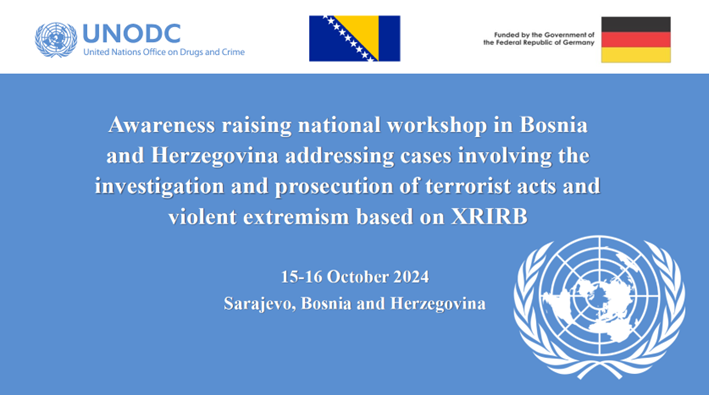UNODC Supports Bosnia and Herzegovina to Prevent and Address Terrorist Acts and Violent Extremism Committed on the Basis of Xenophobia, Racism and Other Forms of Intolerance or in the Name of Religion or Belief
15-16 October 202, Sarajevo, Bosnia and Hercegovina: The global threat of terrorism and violent extremism driven by xenophobia, racism, intolerance, or in the name of religion or belief (XRIRB) has escalated in recent years. XRIRB actors differ in their ideological foundations but are often connected to racism, misogyny, xenophobia, Islamophobia, anti-Semitism, and hostility toward minorities and the LGBTQ+ community. In some Member States, this also includes anti-institutional violence.
In this context, and to assist Member States in better understanding and responding to this phenomenon, UNODC published the Manual on Prevention of and Responses to Terrorist Attacks on the Basis of Xenophobia, Racism and Other Forms of Intolerance, or in the Name of Religion or Belief in April 2022.
The XRIRB phenomenon is also present in South-Eastern Europe. Addressing the root causes of terrorist and violent extremist ideologies is crucial to ensure long-term stability in the region. In this regard, UNODC organised an awareness-raising national workshop on addressing cases involving the investigation and prosecution of terrorist acts and violent extremism based on XRIRB in Sarajevo on 15-16 October 2024.
The training, which was made possible thanks to the support of the Federal Republic of Germany, brought together authorities from relevant national agencies, academia, law enforcement, policymakers, and international experts. The workshop focused on building the capacity of public officials in Bosnia and Herzegovina to address terrorist attacks and violent extremism based on XRIRB whilst also strengthening their understanding of the XRIRB phenomenon.
During the opening ceremony, Mr. Thomas Fitschen, Ambassador of the Federal Republic of Germany to Bosnia and Herzegovina, emphasised the need to tackle the threat of terrorism and violent extremism, including in the region. He stated that “the Federal Government as well as the German Embassy place great emphasis on the cross-border fight against terrorism and on the cooperation with UNODC - including the prosecution of XRIRB-related hate crimes and the prosecution of the use of online platforms to finance violent extremist structures and activities.”
The workshop enabled international experts to share insights on how XRIRB ideologies spread globally and the unique challenges they pose. Discussions covered trends in a number of Member States, highlighting both national and international responses, as well as the critical role of digital platforms in the mobilisation of XRIRB actors. The workshop also examined how XRIRB groups are financed and the need for ongoing research and action to address this evolving threat.
UNODC has conducted workshops and training sessions across Latin America, Europe, and Africa, to build the capacity of Member States to more effectively address XRIRB-related challenges. The long-term goal of these efforts is to establish a professional forum to share lessons and experiences, fostering stronger inter-institutional collaboration, and enhancing regional and international cooperation.
